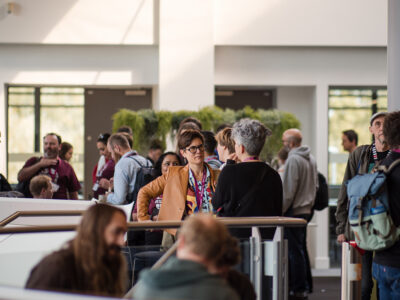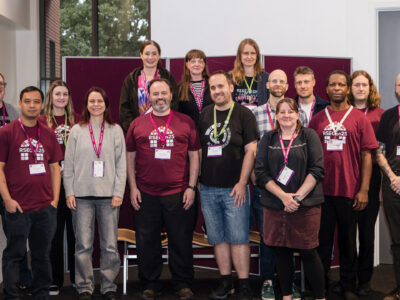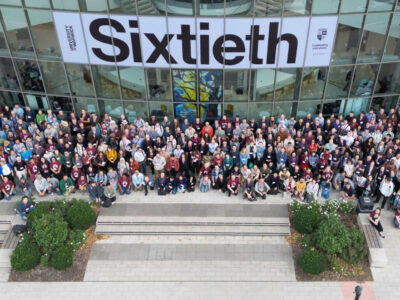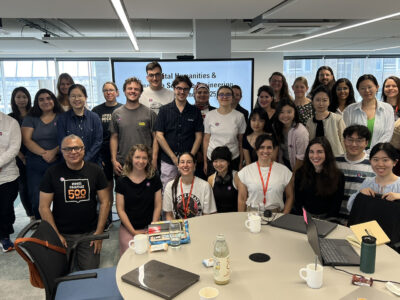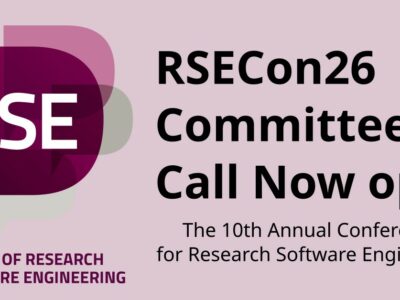Creating Sustainable Change In The Research Software Ecosystem Through Participatory Processes
Anelda Van der Walt recently applied for funding from the Society to attend a funders workshop in Sweden. Here is her report from the event.
The 3rd International Research Software Funders Workshop, jointly organised by the Research Software Alliance and the SciLifeLab Data Centre, took place from 11 – 13 September 2024 in Uppsala, Sweden. The workshop aimed to bring funders and experts together to discuss the operationalisation of the Amsterdam Declaration on Funding Research Software Sustainability (ADORE.software). The primary focus was on developing monitoring and evaluation frameworks for funders to understand the impact of existing and new funding models and programmes on research software.
As a bonus, the European Virtual Institute for Research Software Excellence (EVERSE) hosted a co-located workshop on 10 September. The EVERSE workshop aimed to highlight the project’s achievements and engage key stakeholders attending the Funders Workshop.
Since numerous outputs already focus on the programmes, participants, and other aspects of the EVERSE and Funders Workshop, I will take a more philosophical approach in this blog post. Below is a list of other outputs from the workshops.
This year, I asked permission to join the International Research Software Funders Workshop. African voices and those from Asia and Latin America are sorely missed in the funders’ conversations, perhaps because international organisations fund much of the research in these regions. The two organisations I represent, Talarify and RSSE Africa, are not on the list of invitees to the Funders Workshop since they’re not recognised as funders or decision-makers in the traditional sense. However, Talarify has financed awareness creation, training, and mentoring in African research software spaces for almost 10 years. I self-funded my event participation and am grateful to the UK Society for Research Software Engineering, which will retrospectively reimburse my flight and accommodation expenses through their Events and Initiatives Grant scheme!
Theory of Change
I was really excited to learn that the workshop would focus on using a monitoring and evaluation tool, the Theory of Change, to evaluate the causal relationships between activities and programmes in the funding space and the ultimate goal research software funders aim to achieve. I think the value of creating a good theory of change cannot be overstated, and I strongly encourage anyone working in an area where long-term impact is sought, to explore it. Since the Funders Forum’s aims are all about enabling change in the research software ecosystem, the tool seems very well positioned to help think carefully about the actual long-term impact that is sought and how specific actions (or funding choices) can help lead to short and medium term change that will lead to the long-term impact. I’ve included some background to explain the Funders Forum and its relationship to the Funders Workshop at the end of this post for context.
For a theory of change to be useful, it is essential to understand the problem well and link an ultimate impact to it. Without understanding the problem, one might seek an outcome that will not enable the desired change. One then works backwards to identify medium—and short-term outcomes, outputs, and activities that will aid in achieving the ultimate outcome. A theory of change should also include the inputs, assumptions, and risks associated with it.
The Funders Forum and Workshop Philosophy
This is where I started wondering about the current philosophy of the Funders Forum and Workshop. The platform is an exclusive opportunity for funders to meet and discuss critical issues in research software sustainability and how funding relates to them. It is wonderful to see what has been achieved in three years through the hard work and commitment from key stakeholders like ReSA, the Sloan Foundation (through funding of the Funders Forum and International Workshop), members of the Funders Forum and repeat participants of the Funders Workshop. As Neil Chue Hong, Director of the Software Sustainability Institute, rightly noted after the first International Research Software Funders Workshop: “Ten years ago, I could never have imagined that a workshop like this would be possible.”
The Funders Forum and Workshop have provided platforms for much-needed conversations between funders across disciplines and continents.
Missed Opportunities
However, this problem cannot be solved by funders alone. Can funders in isolation really define the problem we’re trying to solve and come up with solutions? Would it not make a lot of sense for funders to engage much closer with (1) the people who develop software, (2) trainers involved in capacity development initiatives, and (3) software users, to identify priorities and opportunities that can inform funding programmes and collaborative funding initiatives? In fact, we also discussed the value that could be gained from including individuals and groups who end up not using tools they receive training in but don’t end up adopting i.e. “bouncing users”. I believe there are incredibly valuable lessons to be learned from their experiences.
According to the Center for Theory of Change,”Theory of Change is a rigorous yet participatory process whereby groups and project stakeholders identify the conditions they believe have to unfold for their long-term goals to be met.”
During the workshop, we had some really interesting conversations about the potential value of funders engaging directly with these groups of people to gain a comprehensive insight into the status of research software development, contribution, and uptake.
Is there scope for the Funders Forum and Workshop to evolve to become more participatory and break down knowledge flow barriers to build on the knowledge and experience of everyone in the ecosystem to create the change we want to see?
There’s a risk in that research software funders include only a set list of organisations and, therefore, viewpoints. Even if all traditionally recognised research software funders eventually join the conversations, it will be limited in scope because most research software endeavours, in Africa, for example, are funded by international organisations (the NIH, Wellcome Trust, World Bank, and others). The forum may become an echo chamber where innovation is stalled due to a lack of input from (1) the lived experiences of diverse stakeholders in the research software ecosystem and (2) the continued under-representation of certain regions and disciplines. There is also a real risk that the hidden work making the research software ecosystem move forward but is currently not funded through formal mechanisms or recognised research software funding organisations, will remain hidden and, therefore, unfunded. The machinery of the research software ecosystem is complex, with many contributions from sometimes unexpected places and people. The more we speak to each other and create spaces for everyone to contribute, the higher the chance of creating real change.
I look forward to continuing to participate in the conversations and contributing to solutions that can ultimately benefit everyone, including research software communities from Africa, Asia, and Latin America, whose voices are currently wholly missing from decisions that have global reach. Through participatory, collaborative efforts and by breaking down barriers to participation, we stand a chance to do science for the greater good of all.
Acknowledgement
Thanks to Yo Yehudi for constructive feedback on making the post more digestible.
Background for context
Introducing the International Research Software Funders Workshop and Funders Forum
Many individuals working in research software worldwide are unfamiliar with the International Research Software Workshop or the related ReSA-hosted Research Software Funders Forum. This does not only include individuals from the Global South. Here, I’ve included a short introduction to the initiative for ease of reference.
“The Research Software Funders Forum is a collaboration of funding organisations committed to supporting research software, and those who develop it, as fundamental and vital to research. It provides a formal mechanism for funders to share practices and consider how to address common challenges to achieve the significant cultural change needed across the research sector globally.”
Terms of Reference
The terms of reference (ToRs) are available online. According to the ToRs, the forum aims to provide a formal mechanism to increase:
- Sharing of funding practices for research software and the people that develop and maintain it, and learning about those practices, to encourage reflection and advancement.
- Consideration of how to address key research software community challenges, both technical and social (such as diversity, equity and inclusivity) to achieve the significant cultural change needed across the research sector globally.
- Expansion of networks to increase sense of community and identification of collaboration opportunities.
- Consideration of opportunities to achieve long-term sustainability for research software, especially those that are part of key global infrastructures.
Participation in the funders forum is open to “any initiative that funds research software.” The Alfred P. Sloan Foundation funded it in 2022 and 2023 and renewed funding to ReSA in 2024, which will continue until 2026. The forum meets virtually every 6-8 weeks and annually at the International Research Software Funders Workshop.
International Research Software Funders Workshop History
The first International Research Software Funders Workshop: The Future of Research Software was hosted in 2022. The main output from this event was the draft Amsterdam Declaration on Funding Research Software Sustainability (ADORE.software). Version 1.0 of the declaration was released in 2023, and institutions were invited to sign it to show their commitment to research software. In 2024, individuals also became eligible to sign.
The second International Research Software Funders Workshop, Investing in People: Anticipating the Future of Research Software, took place in 2023. This blog post explains the programme and its outputs.
List of reports and blog posts about the 3rd International Funders Forum and EVERSE workshop
- https://adore.software/2024-international-research-software-funders-workshop/
- https://www.researchsoft.org/blog/2024-10/
- https://zenodo.org/communities/2024-research-software-funders-workshop/records?q=&l=list&p=1&s=10&sort=newest
- https://www.scilifelab.se/news/scilifelab-and-data-centre-co-host-two-events-elevating-the-importance-of-research-software-in-sweden/
- https://zenodo.org/records/13915755
Anelda’s attendance at the event was supported by the Society’s Events and Initiatives fund, which provides financial support for events and initiatives which support our mission statement and charitable objectives.

